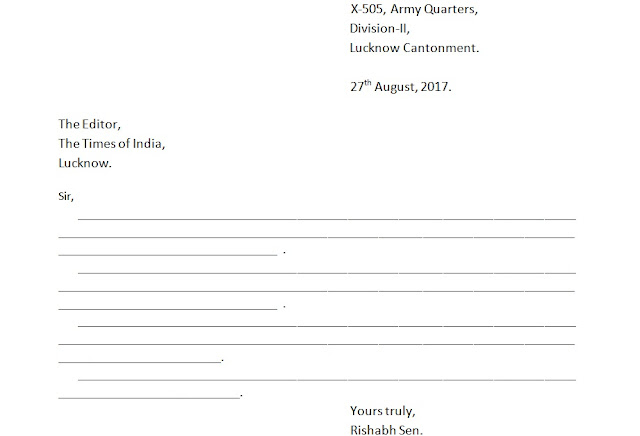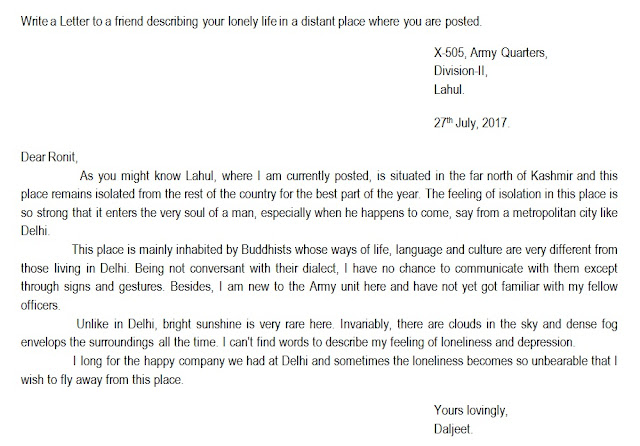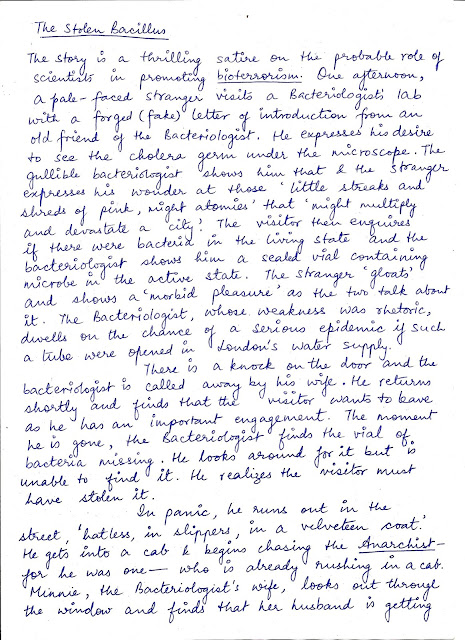Some important notes and study material for school level English. For queries, reach me on aviralkhurana@gmail.com.
Thursday, 14 September 2017
Techniques for writing Precis WITH EXAMPLES
1. To write an effective précis, read the passage several times for a full understanding.
Now, is discipline necessary at all? Please listen carefully. Don’t immediately say YES or NO. Most of us feel, especially while we are young, that there should be no discipline, that we should be allowed to do whatever we like and we think that is freedom. But merely to say that we should be free and so on has very little meaning without understanding the whole problem of discipline.
The keen athlete is disciplining himself the whole time, isn't he? His joy in playing games and the very necessity to keep fit makes him go to bed early, refrain from smoking, eat the right food and generally observe the rules of good health. His discipline and punctuality is not an imposition but a natural outcome of his enjoyment of athletics.
It was easy to get entry into his winter resort because all Soapy had to do is break some trivial law and he was inside with no questions asked. His plan was to go to an expensive restaurant have some exorbitantly priced dishes. When he could not pay the bill, the officials would escort him straight to his trusted winter abode. Having smartened himself up with a clean shave and a wearing a coat hand out to him long back by a philanthropist, he stealthily entered a restaurant hoping that none of the waiters would notice his tattered trousers and shoes. He decided to order a mallard duck with a bottle of White Burgundy and other luxuries. Regrettably for Soapy, as soon as he got into a grand restaurant, the chief waiter noted his ratty trousers and drove him out of the restaurant.
INFORMAL LETTER- FORMAT AND RULES
(CLICK ON THIS FORMAT AND IT WILL OPEN AS A CLEAR PICTURE. RIGHT CLICK AND SAVE IT THEREAFTER.)
Tuesday, 12 September 2017
Answers to Transformation Exercise posted on 12.09.2017
1. No sooner did she finish cooking than her son shouted he was hungry.
OR
No sooner had she finished cooking than her son shouted he was hungry.
2. She asked John whom he had met the previous day.
3. Rohit exclaimed that he had done very/extremely well.
4. Nothing but hard work can help you achieve the best.
5. The movie was too bad to be sat through till the end.
OR
The movie was too bad for me to sit through it till the end.
6. Two final witnesses were heard by the judge before writing the sentence.
7. In all probability, it will rain today.
8. It is said that he is wrongly accused.
9. This bicycle is not only strong, but also stylish.
10. Few other diseases are as deadly as cancer.
11. Before adding the concentrate, (you should) stir the mixture well.
12. Steps for preserving the monuments are being taken by the government.
OR
Steps for preservation of the monuments are being taken by the government.
Some practice in Transformation
Solve this worksheet yourself:
1. Hardly had she finished cooking when her son shouted he was hungry. (No sooner...)
2. She said to John, "Whom did you meet yesterday?" (She asked...)
3. Rohit said, "How well I have done!" (Rohit exclaimed...)
4. Only hard work can help you achieve the best. (Write as a negative sentence)
5. The movie was so bad that I couldn't sit through it till the end. (Use 'too...to')
6. The judge heard two final witnesses before writing the sentence. (Two final witnesses...)
7. It will probably rain today. (In...)
8. People say that he is wrongly accused. (It...)
9. This bicycle is both strong and stylish. (This bicycle is not...)
10. Cancer is one of the deadliest diseases. (Few...)
11. Add this concentrate after stirring the mixture well. (Before adding...)
12. The government is taking steps to preserve the monuments. (Steps for...)
********************
(Answers will be posted on the morning of 14.09.2017)
Sunday, 10 September 2017
Essay and Letter Writing
Instructions for Essay Writing
1. Read the topic carefully. Cover each part of the question properly. Each part has a definite weightage. Do not leave any part unanswered.
2. Choose your topic carefully. All kinds of essays are given due weightage and marks. Never think that a particular choice will result in loss of marks. Story writing for example is as advisable as argumentative or visual-based. But be careful enough to write a story like a story. 4-5 characters, a twist, a lesson in the end, 1st person point of view, some dialogues are needed.
3. High-flown language isn’t needed. Well-phrased sentences and use of appropriate vocabulary is what is given credit. Essays based on personal experiences are always welcomed by examiners.
4. A descriptive essay requires details of sensory perception. Use plenty of adjectives to add weight to your description.
5. In argumentative essays, views for or against the motion are to be accepted. Credit is to be given for a cohesive, well-constructed, logical argument and ideas and reasoning based on personal experience. Do not sit on the fence. Write either in favour or against.
6. When you are supposed to begin or end with a particular line or phrase, do not alter it at all. Nor should you change its position.
7. In picture compositions, a wide range of interpretations is accepted. Do not, however, write an itemized description. Take the whole picture as one setting or theme.
Instructions for Letter Writing
Be careful about formats. Answer each part of the letter giving equal importance to each.
Practise the format of letter. Underline the part of the question that you are supposed to address.
Formal Letter:
*From address (Home/school)
*Date
*To address [spelling counts]
*Salutation [Sir/ Madam/ Dear…]
*Subscription [Yours faithfully, / Yours truly, (for letters to editors)]
*Name + surname/initial
Informal letter:
*Address (Home/school)
*Date
*Salutation- Dear/My dear [-name]/(relation-Dad, Mom, Aunt…)
*Subscription- Yours lovingly, /Yours affectionately, /Your loving..., /affectionate...,
*First name only
Ensure that the format is correct and that the points of each letter are clearly brought out.
Friday, 8 September 2017
Précis Writing
- According to the number of words specified in the question, two sets of lines and columns (meaning two grids) should be drawn first.
- Each line and column has to be numbered accordingly.
- Only one word is to be written in each box as has been shown to you.
- After the grids are ready, the headings ‘Rough Précis’ and ‘Fair Précis’ should be written above each grid.
- While completing the Rough Précis, words may exceed the number specified in the question. E.g. If you are asked to write a précis in not more than 60 words, the rough précis may exceed the number to 65 or 68.
- Keeping the question in mind. Choose the points needed for your answer from the passage. Details not asked should be left out.
- Do not lift or copy exact sentences from the passage. The précis should be in your own words, just like the answer to all the comprehension questions and should be written in indirect speech.
- After completing the Rough Précis, you will have to read through it to check and see where you can fit in the important words by cutting out useless words in the Rough Précis. All corrections will be done by you only in the Rough Précis.
- After making all the necessary changes in the Rough Précis, copy the corrected précis into the fair grid already numbered by you.
- Most important- After writing the Rough Précis, draw a diagonal line across the Rough Précis to ensure that the examiner corrects and marks on the right précis.
- Do not erase the lines and columns drawn and numbered by you.
Tuesday, 14 March 2017
SUPERLATIVE DEGREE
ABSOLUTE SUPERLATIVE
This superlative describes the best thing/person in a class.
He is the most disciplined boy of the school.
No other boy of the school is as disciplined as he is/him.
No other boy of the school is more disciplined than he is/him.
This book is the best among all books.
No other book is as good as this.
No other book is better than this.
NON-ABSOLUTE SUPERLATIVE
This superlative describes one of the best things in a class, but not the absolute best.
He is one of the most disciplined boys in the school. (This means he is one among the best boys but not the only one. Remember to use a plural noun like 'boys'.)
He is more disciplined than many other boys in the school.
Few (or Not many) boys in the school are as disciplined as him.
Few (or Not many) boys in the school are more disciplined than him.
Transformation of Sentences Part 4-- SOME MISCELLANEOUS TRANFORMATION STRUCTURES
With consists we use 'of' but not with 'comprise(s)'.
The team consists/consisted of eleven players.
The team comprises/comprised eleven players. (NO 'OF')
2. OWING TO
Owing to is used for mentioning reasons for something that has happened. It means 'on account of'.
We cancelled the match owing to the heavy rain.
His reading was hesitant owing to a stammer.
3. ALL/ EACH/ EVERY
All the projects have been assigned. (plural verb)
Each of the projects has been assigned. (singular verb)
OR
Each project has been assigned to a responsible manager.
Every project has been assigned. (Every lays emphasis on completion of the task)
4. NONE/ NEITHER
None is used for more than two people or things.
None of the mangoes is sweet. (None of the mangoes are sweet is also accepted.)
Neither is used when we talk of two persons or things.
Neither of the doctors is skillful.
Neither doctor is skillful.
5. IN ALL PROBABILITY
It can replace 'probably' in a sentence.
Jasdeep has probably forgotten the date of his mother's birthday.
In all probability Jasdeep has forgotten...
6. ...AS HE IS/ ...THOUGH HE IS/ ...THOUGH HE MAY BE forms
Poor as he is, he is honest. (Though he is poor, he is honest.)
Poor though he is, ...
Poor as he may be, ...
Poor though he may be, ...
If past time is intended 'might have been' can be used.
Poor though he might have been, he was honest.
Tuesday, 24 January 2017
ENTERPRISE BY NISSIM EZEKIEL
But none the less, they are divided into groups, each group attacking the other. Engrossed in their quarrel, they lose their ways and forget noble aspirations which had motivated their enterprise. Their goal and their purpose were forgotten and their idealism is all gone. Some of them decide to leave the group. Frustration and difficulties overwhelm the human spirit and many do not have the courage to face the realities of life. They seek relief in escape and withdrawal. Many of us are such introverts. Some try to pray and seek Divine assistance and blessings, forgetting that God help those who help themselves. Their leader feels that he smelt the sea and he feels that their goal is near (a reference to Moses who led Israelites back to their country and when he reached the Red Sea, he parted it with his staff and made way for everyone to pass by God’s intervention). He shares this realization with other pilgrims in a last attempt to inject hope into the group that has lost all its cohesion and is on the verge of becoming a ‘straggling crowd of little hope’.
A SAMPLE OFFBEAT REPORT
The Voice of the Rain
A. Extract-Based Question Read the extract and answer the following questions: “And forever, by day and night, I give back life to my own ...
-
Write a letter to the Commissioner of Police of your city requesting him to organise traffic rules awareness week for the general public. Yo...
-
THOUGH/ ALTHOUGH/ DESPITE/ INSPITE OF Though/ although * Though he was not well, he took the exam. Despite (+ing verb) or (+the fac...
-
"The Laburnum Top" is a poem by Ted Hughes that explores the relationship between nature and life, particularly focusing on the co...





